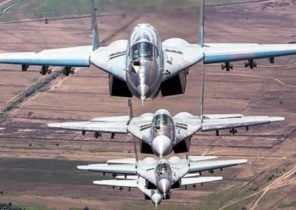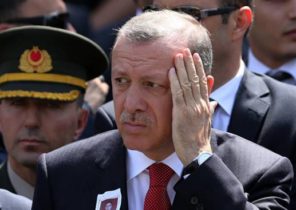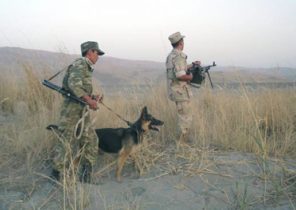
The document “Theses on politics of the Republic of Poland against Russia and Ukraine” dated 4 March 2008 were classified. Beneath it is signed by the head of the Department for Eastern policy Minister Yaroslav Bratkevich (Jarosław Bratkiewicz). Access document had four people, including the Minister of foreign Affairs Radoslaw Sikorski (Radosław Sikorski). Secrecy lifted in October 2015. On the first page of seven-page document made inscriptions: “Very good material. I agree with the holding of the meeting. Please prepare material in the form of notes for the Prime Minister’s office” and “Use in a speech before the Sejm. R. S.”. The paper reported that “the Department for Eastern policy, Ministry of foreign Affairs proposes to hold a private discussion on the Polish policy towards Russia and Ukraine for the development of specific steps in our diplomatic service in this direction”.
Waszczykowski: this document is the first step to move away from the Pro-Ukrainian policy
“This document was the first step to move away from Pro-Ukrainian politicians and turning to a Pro. The authors did not cherish any illusions about success, but decided that the Pro-Russian course will be a kind of tool, a trick that can be used against the West in order to strengthen the prestige,” — said in an interview with the Polish press Agency (PAP) Minister of foreign Affairs Witold Waszczykowski (Witold Waszczykowski). He adds that “that’s when Poland moved from a policy of Jerzy Giedroyc (Jerzy Giedroyc), although blaming the current government.” “Ukraine has proposed the path of integration with the EU, but only quasiinternational ties with the West, the ersatz integration,” he evaluates.
“As a result of these actions, we were embroiled in a losing cooperation with Russia, which saw that we are playing. After some time this led to the fact that Donald Tusk (Donald Tusk) had to make in Katyn separate solemn events without President Lech Kaczynski (Lech Kaczyński), the Minister said. Tusk wanted to show off your experience and knowledge in the sphere of relations with Russia, which he allegedly had to move out West. However, this policy turned out to be transparent for the Russians, they decided that since Tusk wants to flirt with them, it will have its price, in particular, the withdrawal from Eastern policy and reducing the role of Lech Kaczynski”. Waszczykowski added that although the document appeared in 2008, i.e. in the period when he held the post of Deputy Minister of foreign Affairs and led the negotiations on the missile defense system, it is not acquainted. The document States that the document was intended to Radoslaw Sikorski, Grazyna and Bernatowicz (Grażyna Bernatowicz) and Snappa Ryszard (Ryszard Schnepf).
Waszczykowski said that the document contained “many incorrect assessments” and the text indicates that it was decided “to abandon the realization of Polish interests in the East.” “Although Poland was a full member of the EU and NATO, Polish diplomacy was obliged to promote in these organizations, the interests of his country, and not to adapt the Polish policy toward the average of the interests and views of other member States, justifying the fact that it is the interests of the EU or NATO”, — said the Minister. “The authors put forward the thesis that modern Russia is not guided by a Messianic ideology in the form of Orthodoxy in the universalist understanding of pan-Slavism or the Communist doctrine. This is fundamentally the wrong point. Russia already relied on the ideology on which it rests: the concept of Alexander Dugin on the establishment of the so-called Russian world. Putin officially promoting it since 2007, that is, the document’s authors knew about it”, — believes Waszczykowski. He adds that the text sounds “wrong argument, if the economic strength of Russia is limited. Meanwhile, Moscow for many years to rebuilt its economy under the Imperial and military development, and later she used their strength in the attack on Georgia and Ukraine”. Waszczykowski also calls the unproven thesis that “Russia gravitates to the West in the face of Chinese and Islamic threat.” He believes that “everything was the opposite.” “The paper writes that the West sees Moscow’s ally and source of resources. However, the West was wrong, and the Polish analysts have had to know that this is not so, because Russia is not an ally and a resource, and provider of destabilization”, — stressed the Minister. — Taking this assessment, the authors consciously or unconsciously has given Russia special rights in relation to our region, change is beginning just now.” As the Minister adds, “the text also hear that the Russian elite are aware of some limitations, but it is not, because they despised and continue to despise the West.”
Waszczykowski said that “the authors of the document gave a very negative assessment of the situation in Ukraine, seeing there postsovetizma, clans, corruption, opacity of the political process”. “Lot of truth in this, only they do not see in Russia. Branding Ukraine, they represent Russia as a country that poses no threat is also a source of resources and expressed willingness to cooperate,” he adds.
Foreign Minister calls absolutely false “the thesis of the shallow depth of Polish-Ukrainian relations, relying only on personal contacts between, in particular, Aleksander Kwasniewski (Aleksander Kwaśniewski) and Leonid Kuchma. There is a lack of information: at the time our relationship was very developed, such as in the military sphere”. “The conclusion is a call not to go beyond the actions of the EU and NATO, that is, de facto, to limit Polish interests, reducing them to the interests of the leading powers of the European Union — France and Germany. A proposal to limit cooperation with Ukraine is, in turn, is practically a recognition of the fact that to the East from the Polish border begins the Russian sphere of influence”, — said the Minister. “Also the wrong notion that Russia will not risk a collision with a United Europe and the West. After a few months we got to Georgia, and now three years have seen a war in Ukraine,” — emphasizes Waszczykowski. The Russian-Georgian conflict erupted in early August 2008.
“The Canon of perceptions and images of Russia and Ukraine”
The document, which appeared in March 2008, we read that “in the previous period, especially when the government was the party “law and Justice” (PiS), the result of insufficiently thorough analysis and estimation, and distributed in the media of demagogic propositions there is a certain Canon of perception and image of Russia, Ukraine and the Polish policy towards these two countries.” This Canon, says the paper, “bearing all the hallmarks of a taboo, can be called “Patriotic political correctness,” as a departure from it threatened to attack politicians and the press, accusations of betrayal of “national interests””. The main elements of this Canon are reduced to the following axioms: Russia — the eternal enemy of Poland; Moscow will continue to engage with Warsaw in the conflict; the Polish policy towards Russia on the one hand and the other post-Soviet States on the other — a “zero-sum game”. “After all or we support the independence of these States through their active attraction to Poland, and through it — to the West, or into contact with Russia, in fact, supported the Imperial and aggressive policy of the Kremlin.”
In the document, however, stresses that “it is apparent truth or half-truth, which comes from a narrow understanding of the modern political context that is not fully take into account the fact of our membership in EU and NATO.” “There are reasons to suppose that the modern Russian Federation is seeking to regain superpower status, participating in decision-making on global issues in the framework of the “concert of Nations”. The formation of superpower status entails the restoration of Russian influence in post-Soviet countries (CIS)”. However, as stated in the document, it does not mean that Moscow is returning to its old Imperial form. This is indicated by the fact that the Kremlin did not lead the Russian society to a state of “Messianic mobilization”, pushing on the great historical achievements. “This society is inherent, rather, the apathy, the need to deal with everyday problems and internal fragmentation (the confrontation of the public and wealthy elites)”, — stated in the text.
This thesis, as emphasized by the authors also confirmed that “although the Russian political regime becomes authoritarian traits, he does not have the bureaucratic, police and military force that the previous Russian/Soviet authoritarian regimes.” “Employees of the incarnation of the elite in the less guided now long-term goals and more about struggling to survive amid conflicts in the circles of the establishment (the struggle between “clans”) and society (“antibarbie mood”)”. “The material resources of Russia are great, but they are not used for the benefit of modernisation and development of the country. In addition to their use is required to attract external economic resources (capital and technology). Thus we can say that the economic power of Russia are limited,” — the document says.
“Russia is an important ally in confronting the problems coming from the South”
 © AP Photo, Alan DiazБывший the Minister of foreign Affairs of Poland Witold Waszczykowski
© AP Photo, Alan DiazБывший the Minister of foreign Affairs of Poland Witold Waszczykowski
“The relative weakness of Russia on the background of its environment, particularly rapidly developing China, as well as generating serious Islamic threat to the South, inclines her (with all its traditional bias) to focus on the West as the most reliable partner. The West (especially Western Europe) sees Russia as an important ally in the confrontation of serious issues, coming from the South, primarily Islamic radicalism and terrorism as well as the huge resource base that could provide the Western world with significant economic support,” the document says.
“Taking into account the above, note that the possibility of political, economic and military expansion of Russia is rather limited. They face major obstacles in such CIS countries as Georgia and Ukraine. In turn, to influence (in an effort to obtain “special rights”) for EU and NATO countries in Eastern-Central Europe in very small or even zero degrees”, — the document says. The text notes that “the Russian elite in spite of their intransigence and belligerent attitude (peculiar economic and political Nouveau riche) are aware of the existence of the above restrictions.”
“As a result of their attempts to influence the States of East-Central Europe reduced to diplomatic intrigues (for example, accusations of Poland in the “irresponsible Russophobia”) and economic maneuvers (like the gas pipeline “Nord stream” to bypass Polish territory),” assesses the document. “If the Russian leadership at the moment is aware of the limitations of their capacity to impact on Poland, Polish policy towards Russia must also take into account the above limitations and circumstances that in no way do not indicate a need to suspend our activity in the Eastern direction. Active dialogue with Russia poses to Poland value in itself, not to mention the fact that the Polish state is associated with Russian economic interests, which are not confined to energy issues (although that certainly plays an important role in the Polish-Russian and Russian-European relations) or mutual interest the issues of cultural-intellectual sphere,” write the authors of the document.
As you can read on, this dialogue “not only refute any accusations of “Polish Russophobia”, and will strengthen Poland as the main expert on Russia and the interpreter of her actions in the family of Western countries”.
“Taking into account the continued interest of the West to Russia, not comparable to any other post-Soviet States (including Ukraine), Polish know-how in Russian issues is in the era of information of meritocracy is a core value to enhance our image and position in the Western world”, — emphasized in the text. “The more we know Russia and the more accurate it will be able to assess, the stronger we will be able to influence the General policy of the EU and the West in this country and the former Soviet Union, including Ukraine. Therefore, the policy towards Russia and the politics of Ukraine do not cancel each other. In turn, escapism and passivity in the policy in Russian direction (observed under the government of “Law and Justice”) should be called a manifestation of “tough diplomacy” and the Polish complexes, amateurism, cowardice and a kind of “servile positions” in the historical process. However, as shows past, Poland with its potential (especially the cultural and intellectual) is able to conduct against Russia’s ambitious policy, and today with our strong position in NATO and the EU it became even more real.”
 © AP Photo, Efrem LukatskyБывший the President of Poland Alexander Kwasniewski
© AP Photo, Efrem LukatskyБывший the President of Poland Alexander Kwasniewski
As the author of the document, “Ukraine’s rapprochement with the institutions of the Western world, the crown of which will be its future membership in EU and NATO, would serve to break the post-Soviet zone, and thus the final reimperialization of Russia”. “We should not, however, forget he said that with all the progress of modernization and democratization in Ukraine the reform process in this country is still different from Polish and Central European model of transformation. In Ukraine, clearly there are vestiges postsovetizma that find manifestation in specific political culture, the provincial politicking, the existence of oligarchic groups (modeled on the Russian “clans”) and rampant corruption.”
The document refers to the need for “serious reflection about the real influence of Poland in Ukraine and the readiness of both the Ukrainian society and elites to a lasting strategic Alliance with Warsaw”. “It seems that our effects are unable to deeply take root in Ukrainian soil, a Central rod until 2005 was friendship and mutual trust between presidents Kwasniewski and Kuchma”, — reads the text. “We should spread the idea that policy towards Russia should not expect a certain mythologized in the political and media discourse of “fracture”. Over the Polish-Russian contacts, contrary to popular belief, on a purely bilateral level are not attracted any large-scale controversial issues. The issue of energy security is multifaceted, and in the context of the gas pipeline “Nord stream” recipient of our actions should be first and foremost Germany and in the whole EU, not Moscow,” write the authors of the document. They think “Polish specialization in Russian and in a broader sense —Eastern European topics will allow Poland to gain a foothold in the Western family of Nations, waiting from these expert evaluations, and at the same time will facilitate the conduct of policy towards Russia, Ukraine and other former Soviet States.”
“Poland succumbed to the tactics of the Ukrainian elites no praise and promises”
Relations with Ukraine are measured as follows: “one Might get the impression that the contacts with Kiev Poland too much succumbed to the tactics of the Ukrainian elites. You need to give up praise and promises (not always running and not even always real) in the context of relations of Ukraine with the West, which began to be perceived as an element of prestige and the argument in the internal political clashes in the struggle for power and revenue from privatization”. “Steps should be taken to overcome such “Patriotic politically correct” activity in respect of Ukraine, replacing it with pragmatism and, where required, friendly critical approach to that state which takes into account its real opportunities and chances in the field of strengthening relations with the institutions of the Western world”, — the document says.
“We should take into account that Ukraine in the long term will remain outside the framework of these institutions, first and foremost — do not get the status of EU member. In this regard it would be useful to think about the content of the relations of Ukraine with the West quasiinternational content (using the mechanisms of neighbourhood policy, “partnership in the framework of the Association”) at least for the next five years, — it is noted in the text. — It also makes sense to think about the coincidence and divergence of Polish and Ukrainian economic interests (including in agriculture), considering the prospect of creating a free trade area EU — Ukraine and later the country’s accession to the European Union”.







